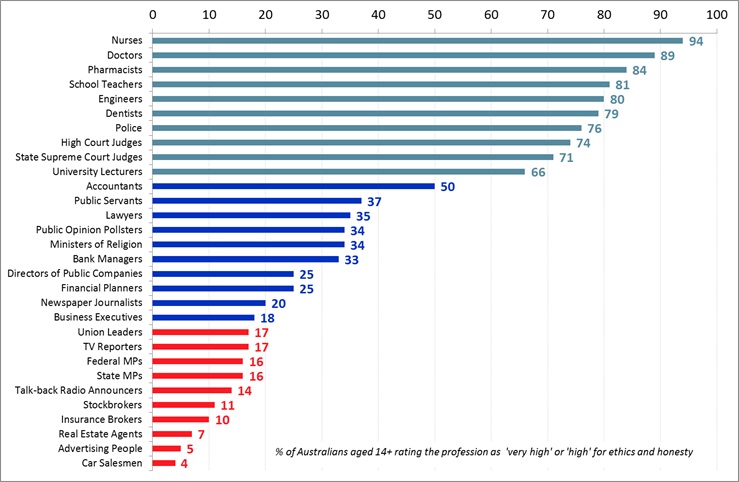When selling is not selling: for consultants
Most consultants are afraid of the “S” word – selling. But selling is not SELLING.
Salespeople generally get a bad rap… have a look at the Roy Morgan Image of Professions Survey 2017… at the bottom down there with estate agents and talk-back radio announcers!

And in one of my workshops on “selling for consultants” I ask the group to rank professions by the degree to which they are respected in the community – salespeople generally come out low on the list too. This implies that the profession of “sales” is just not respected in the world of IT consulting.
The Importance of Influence
But in our professional context we need to see sales more aligned to “influence”. We often need to influence others… as team leaders we need to influence a person to pull their weight on the team. As project managers we need to get buy-in to a concept or a deadline. As an executive we need to “sell” strategies and plans to our Executive Leadership Team and often the Board. As a boss we need to sell ideas to our peers and direct reports. In fact we’re influencing others all the time to get the outcomes we need in the highly connected collaborative professional world in which we work.
So give up the idea that you don’t want a job in Sales: you’ve already got one! It’s a significant proportion of your job and of your day… get over it.
The real question is, can you accept responsibility for sales while maintaining a strong ethical position? The answer is yes… but all our negative stereotypes come from those salespeople who leave their ethics at the door.
So how do you create an environment where “selling” is not selling, but genuine communication of ideas and influencing the people around you to consider a different point of view? With the help of some of my colleagues I drew up this list of ways of building influence in your consulting career that doesn’t require you to drop your ethical standards:
- At the Client site:
- Build trust: become the trusted advisor through:
- Networking: genuine conversation about real subjects that interest both parties;
- Talk about your values: make sure to explain your ethical position for all stakeholders;
- Report: let your boss or peers know what’s going on – before they hear on the grapevine;
- Add value: even if it’s important to you, is the topic you bring to a colleague of interest to them?
- Who to sell to? The process of “Power Mapping” helps you to identify who is responsible for making decisions in an organisation – power rarely follows the formal hierarchy, and if you’re unaware of this you can waste a lot of time working with the wrong people.
- Be engaged with their business: be better acquainted with their business domain than they are…
- Ask questions – if the question’s genuine and relevant, people are always pleased to talk about their expertise;
- Be at the meetings where people ask, “we need another consultant, who should we ask?” Find out when and where the resourcing conversations are being had, and attend – even as an interested bystander. Once you’re engaged with those conversations you can start to offer the services of your company – but if you’re not in the room, you won’t even know you missed the opportunity!
- Build trust: become the trusted advisor through:
- At your Company:
- Attend your company meetings:
- So you know what talent is available: who’s finishing a gig soon? Can I use them on my site?
- Understand who’s on the bench: it’s worth serious brownie points if you can help move people off the bench. So know who’s available, their strengths and weaknesses and see if there’s a real spot for them on your site.
- Influence who’s being recruited: start to attend interviews if you can… this will help you influence the type of people the organisation employs (and also give you an education for how to manage interviews yourself!).
- Understand pricing and estimation: practice, practice, practice… being skilled in the art of estimation will help you create RoI for both your client and your consulting organisation.
- Build your firm’s IP: Top tier consulting organisations write books, create wikis, have consultants blog… why? Because this is all the business’ IP, and grows the value of the organisation as every word is written, used and reused. You’ve heard the phrase: “we wrote the book on that…” – it means we’re knowledgeable and you can trust us. That’s what strong IP does for your organisation and your personal brand.
- Attend your company meetings:
You can do all of the above with total honesty and integrity, but you’re still selling… don’t knock it ’til you’ve tried it!
I hope this list is useful for you – feel free to challenge me if you like… it’s art not science!
Rob.

